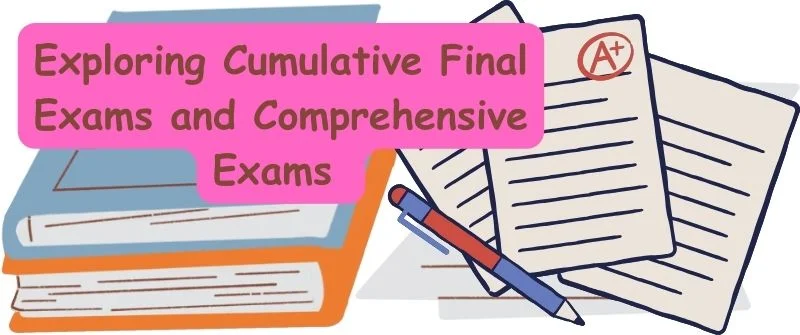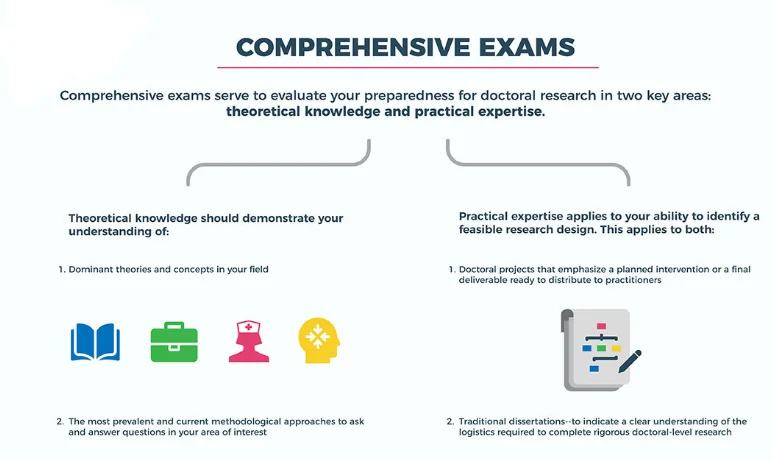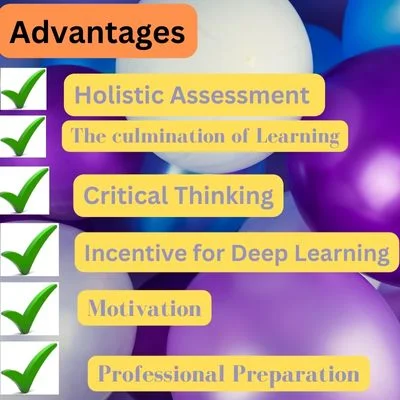Cumulative Exam Vs. Comprehensive Exams: What Each Consists

There are two different assessment techniques in the academic realm: cumulative exams and comprehensive exams.
At its core, cumulative exams cover a wide range of course material and demand that students recollect and use the information they have learned throughout the course.
These tests assess ongoing learning, focusing on integrating and retaining fundamental ideas. Students are required to connect distinct subject matter threads in Cumulative Exams, which fosters a deeper comprehension of the material.
Cumulative Exams are a thorough evaluation tool that encourages students to know the course material from beginning to end consistently.
Exploring Comprehensive Exams
Comprehensive Exams are distinguished by their broad scope and aim. They evaluate students’ capacity for information synthesis, critical thinking application, and demonstration of knowledge learned during their academic curriculum.

Comprehensive tests cover a wider range of topics within a discipline than regular tests or cumulative exams, which only cover a certain portion of the course.
These tests assess a student’s grasp of theories, techniques, and real-world applications to gauge their level of expertise.
They demand that students make connections between various ideas and exhibit a comprehensive knowledge of their topic of study.
Essentially, Comprehensive Exams differ from Cumulative Exams in that they include a wider range of material, test the depth of experience, and act as the pinnacle of an academic discipline’s proficiency.
Differences Between Cumulative and Comprehensive Exams
1. The Scope of Assessment: Breadth vs. Depth
- Cumulative Exams: These assessments have a broad scope, covering material from the entire duration of a course.
They test students’ ability to recall and apply knowledge across various topics, emphasizing breadth of understanding.
- Comprehensive Exams: In contrast, Comprehensive Exams delve deeply into a specific academic field or major. They assess the depth of a student’s knowledge and mastery of a particular subject area, focusing on in-depth understanding rather than breadth.
2. Timing and Frequency: Regularity vs. Culmination
Cumulative Exams are typically administered periodically throughout a course, such as at the end of each unit or semester. They serve to reinforce ongoing learning and encourage regular study habits.
Comprehensive Exams are administered as a culmination of an academic program, often near the end of a degree program, such as during the final year of undergraduate or graduate studies. They represent a comprehensive assessment of all the knowledge and skills acquired throughout the study.
3. Preparing for Success: Study Strategies for Each Exam Type
Success in Cumulative Exams requires consistent study habits, regular review of course materials, and a focus on understanding core concepts from the beginning. Frequent self-assessment and practice are crucial to retaining information.
Preparing for Comprehensive Exams demands extensive and in-depth study. Students must synthesize knowledge gained throughout their academic journey, often involving the creation of comprehensive study guides and extensive review of coursework, research, and notes. These exams may also require more critical thinking and application of concepts.
Pros and Cons of Cumulative Exams

Advantages
Comprehensive Understanding: Cumulative exams strongly encourage students to grasp the entire course content. Such promotes a deeper and more holistic understanding of the subject matter.
Long-term Retention: Studying for cumulative exams often involves revisiting and reviewing previously learned material. The repetition aids long-term retention and helps students remember information beyond the exam.
Critical Thinking: Cumulative exams require students to make connections between various topics and concepts covered during the course. Such measures enhance critical thinking, problem-solving, and a more profound knowledge synthesis.
Reduced Cramming: Since cumulative exams cover all course material, students are less likely to resort to last-minute cramming, which can be stressful and less effective for long-term learning.
Preparation for Future Learning: The skills developed while preparing for cumulative exams, such as organization and time management, are valuable for future academic and professional endeavors.
Fairness: Cumulative exams can be fairer than exams focused on a single section because they assess a broader range of knowledge, reducing the impact of luck or unusual difficulty in a specific section.
Disadvantages
Increased Anxiety: Students who have a lot of material to review and remember may experience worry and tension related to tests.
Time-Consuming: Since students must go over and review the entire course material to prepare for cumulative exams, there may be less time left over for other pursuits.
Risk of Overwhelming: The amount of content that needs to be covered could overwhelm students, resulting in a surface-level grasp rather than a thorough comprehension.
Assessment of Difficulty: Because a great overall result may conceal a student’s lack of understanding in some areas, cumulative tests may not effectively determine a student’s mastery of particular courses.
Reduced Feedback: Due to possible time constraints, instructors may need more time to give feedback on cumulative exams, making it difficult for students to identify areas that need development.
Test Fatigue: Lengthy cumulative exams can lead to mental fatigue, potentially affecting performance towards the end of the test.
Pros and Cons of Comprehensive Exams
Advantages

Holistic Assessment: Comprehensive exams comprehensively evaluate a student’s knowledge in a specific field, ensuring a well-rounded understanding.
The culmination of Learning: These exams culminate in a student’s learning journey, allowing them to showcase their expertise after completing the curriculum.
Incentive for Deep Learning: Students preparing for comprehensive exams are incentivized to delve deeper into the subject matter, fostering a more profound understanding of the material.
Critical Thinking: Comprehensive exams often require students to apply critical thinking and problem-solving skills to complex, real-world scenarios, enhancing their analytical abilities.
Professional Preparation: Many professions and licensing bodies require comprehensive exams as part of their certification process, ensuring that individuals are well-prepared for their careers.
Motivation: Preparing for comprehensive exams can be highly motivating, as success demonstrates high competence and achievement.
Disadvantages
- Stress and Pressure: The stakes are high for comprehensive exams, leading to significant stress and pressure for students, which can adversely affect their performance.
- Limited Scope: These exams may only cover some relevant topics exhaustively, potentially leaving gaps in a student’s knowledge.
- Test Anxiety: The sheer scope and significance of comprehensive exams can trigger test anxiety, hindering test-takers’ ability to perform at their best.
- Overemphasis on Memorization: In some cases, comprehensive exams may encourage rote memorization rather than a deep understanding of concepts as students strive to cover extensive content.
- Limited Assessment Opportunities: Comprehensive exams typically occur infrequently, offering limited opportunities for students to demonstrate their knowledge and improvement.
Cumulative vs Comprehensive: Which is Right for You?
Consider whether you excel in retaining a broad range of knowledge over time (cumulative) or prefer an in-depth understanding of a specific subject (comprehensive).

Evaluate your career and academic aspirations. Cumulative exams may suit continuous learning, while comprehensive exams may align better with fields requiring deep expertise.
Making an Informed Choice to agree with what fits your journey: Reflect on your educational journey. Cumulative exams offer continuous assessment, while comprehensive exams act as milestones.
Your choice should align with your learning style and future endeavors, ensuring a fulfilling educational experience.
Instances when Cumulative Exams are the Best
Cumulative tests work best in educational environments where ongoing evaluation of knowledge retention is important, such as in schools, colleges, and beyond.
They are frequently employed in topics and fields that gain from a comprehensive comprehension of fundamental ideas.
Cumulative tests encourage long-term skill retention and thorough understanding, furthering real-life application advancement.
Instances when Comprehensive Exams are the best
Comprehensive tests excel in higher education, particularly in graduate and doctorate degrees, where in-depth knowledge is prized. Comprehensive tests are frequently used in medical, law, and engineering professions.
These tests have practical ramifications when you enable people to demonstrate their specific knowledge and preparation for professional tasks.
How to Prepare for Each Exam
1. Preparing for Cumulative Exams: Study Techniques
First, review and recall information actively at spaced intervals for enhanced retention. Divide content into manageable chunks for easier understanding and memorization.
Lastly, Mix related concepts during study sessions to improve comprehension and retention.
2. Preparing for Comprehensive Exams: Study Strategies
You can follow these tips as you take this exam:
- Deeply immerse yourself in the subject area, delving into various sources and perspectives.
- Furthermore, connect diverse concepts across the curriculum to build a comprehensive understanding.
- Remember, simulate exam conditions with practice tests to prepare for the length and intensity of comprehensive assessments effectively.
In Conclusion
At last, the choice between cumulative and comprehensive exams hinges on various factors, including individual learning styles, educational objectives, and the nature of the subject matter.
Cumulative exams assess ongoing knowledge retention, making them ideal for continuous learning in standard educational settings. They are valuable for subjects where foundational concepts build progressively.
On the other hand, comprehensive exams shine in advanced education, particularly in fields that require deep expertise and practical application of knowledge. They are a capstone to academic journeys, allowing individuals to demonstrate specialized proficiency.
Overall, the decision should align with one’s educational and career aspirations and personal strengths. Some may thrive with continuous assessment through cumulative exams, while others may flourish by showcasing expertise via comprehensive exams.

Josh Jasen or JJ as we fondly call him, is a senior academic editor at Grade Bees in charge of the writing department. When not managing complex essays and academic writing tasks, Josh is busy advising students on how to pass assignments. In his spare time, he loves playing football or walking with his dog around the park.




